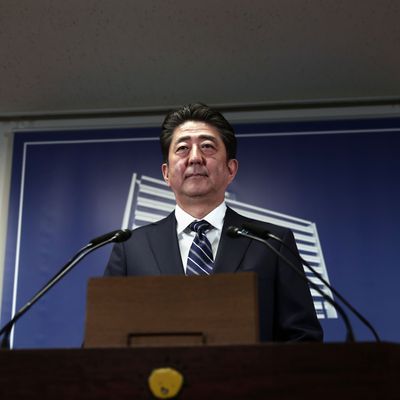
Japanese prime minister Shinzo Abe scored a big win in Sunday’s general election, with his Liberal Democratic Party and its allies retaining a two-thirds supermajority in Parliament. The victory could put Abe on track to become the country’s longest-serving prime minister, and he will likely leverage it to renew his ambition to amend Japan’s constitution to allow for a larger military while continuing his economic-reform program.
That’s why Sunday’s election matters to Japan. But here in the U.S., we might want to pay attention to Abe’s victory for another reason: The circumstances that enabled it could easily be replicated here in 2020 and help carry Donald Trump to a second term in the White House.
For one thing, neither Abe nor his policies are particularly popular. Just a few months ago, Abe’s approval rating was in the gutter, dipping as low as 20 percent in the wake of a series of corruption scandals. North Korea’s nuclear brinkmanship changed all that, however: After the regime in Pyongyang overshot Japan with a ballistic missile and tested an apparent hydrogen bomb in early September, Abe’s popularity surged as he was seen handling the situation proactively. Still, it peaked in early September, when a poll put his favorable/unfavorable numbers at 50/39, and the latest poll puts him back in the negative, at 40/46.
While Abenomics — a mix of loose monetary policy, fiscal stimulus, and structural reforms — has been credited with pulling Japan back from the brink of economic oblivion, the program’s impact has been a mixed bag overall, with the country still suffering from deflation and wage stagnation. Businesses have also balked at some of Abe’s reforms, including “womenomics,” a concerted effort to radically increase the number of women in the Japanese workforce. A planned consumption tax hike has proven controversial. Most Japanese voters want a review of these policies.
Neither is Abe’s approach to foreign and security policy much beloved. His proposed amendment of the constitution, which would remove an article that has limited Japan to a relatively tiny army since World War II, is highly divisive and represents a dramatic break from the past 70 years of policy. Abe has the two-thirds supermajority in Parliament he needs to change the constitution, but an amendment would also have to pass a public referendum, and its prospects there are much less certain.
In addition to his North Korean poll bump, Abe’s main weapon going into Sunday was the total disarray of his opposition. The LDP’s traditional opponent, the Democratic Party (which is, confusingly, liberal whereas the LDP is conservative) has collapsed, and new parties, including Tokyo governor Yuriko Koike’s Party of Hope, have formed to challenge Abe’s government.
While shiny new parties, like French president Emmanuel Macron’s En Marche, can sometimes be attractive to voters upset with the status quo, Japan’s voting system makes it hard for them to break through. Most seats in Parliament are allocated by winner-takes-all votes in each district, which disadvantages parties without some institutional presence. Turnout was also at a near-record low of around 53 percent: Koike and the other new challengers failed to drive voters to the polls and, as such, failed to achieve an upset. Given the collapse of the Democratic Party, the LDP rout was pretty much a foregone conclusion. Indeed, many observers believe Abe called these early elections precisely to take advantage of the chaos among the opposition.
In the U.S., of course, the president doesn’t have the luxury of calling elections whenever it suits him or his party, so Trump will stand for reelection in 2020 with whatever cards he holds at that time. However, it’s not hard to imagine a scenario in which many of the same factors that helped Abe hold onto power despite lacking robust public support redound to the benefit of Trump and the Republicans in three years, even as the president remains historically unpopular and even if the economy doesn’t continue to cooperate.
The worst-case scenario for Trump opponents begins, in an echo of 2004, with a national-security crisis or a war beginning in the year or so prior to the election (a further escalation with North Korea, a war with Iran, or a major terrorist attack on U.S. soil are all possibilities), inflating Trump’s poll numbers and turning out hawkish Republican voters. It continues with the Democrats failing to coalesce around a strong consensus candidate and dividing once again into liberal-centrist and leftist camps. Jill Stein and Gary Johnson (or some other version of them) run again, drawing more voters from the Democratic candidate than from Trump. Turnout is depressed due to Republican voter-suppression tactics and the bad feelings generated among Democrats by a nasty open primary.
Throw in some fake news and Russian trollbots, and before you know it, Trump has won a very similar victory in 2020 to the one he eked out in 2016. In case they didn’t learn this last year, Democrats need to be acutely cognizant of the fact that under the right set of (fairly likely) circumstances, Trump, like Abe, can win even with relatively bad fundamentals.





























